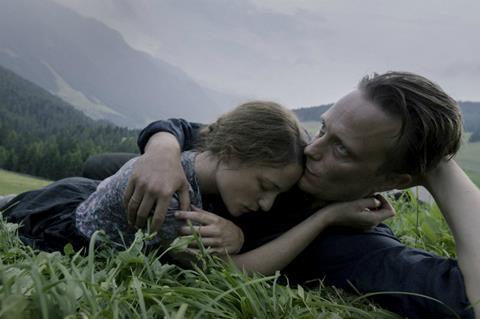Terrence Malick tells the story of an Austrian conscientious objector who martyrs himself for his beliefs

Dir/scr: Terrence Malick. Germany/US. 2018. 173mins.
Terrence Malick often wrestles with the cosmic, the spiritual and the eternal, but with A Hidden Life, the meditative writer-director attacks his usual themes from a rewardingly timely and urgent perspective. Telling the story of Franz Jägerstätter, a religious Austrian conscientious objector who chose prison over fighting for the Nazis, this tormented film follows the same dreamlike, whispery tone of Malick’s post-Tree Of Life work, but that air of gentle contemplation is repeatedly undercut by the distant evil forces which are fast encroaching on these characters’ lives. Malick turns Jägerstätter into a Christ-like figure who martyred himself for his beliefs, but during the course of three hours, A Hidden Life anguishes over the man’s sacrifice in a world that’s increasingly overrun by indifference and wickedness.
Malick pointedly ponders what, if anything, the righteous can do to stop tyranny
Those exhausted by Malick’s instantly recognisable aesthetic won’t jump back on board here, and a cast that features August Diehl and Valerie Pachner isn’t particularly star-studded. Considering that the filmmaker’s recent dramas have been commercial non-starters, A Hidden Life may prove to be a loyalists-only proposition, although the subject matter’s contemporary relevance should raise the movie’s profile.
Set between 1939 and 1943, A Hidden Life stars Diehl as Franz, a farmer happily married to Fani (Pachner), who lives in an idyllic mountain village with their three young daughters. But when he’s forced to enlist in the German army, he refuses to pledge loyalty to Hitler, making him a pariah in a community which considers him a traitor. Even worse, he must stand trial, possibly facing execution.
After several recent films set in modern times, Malick goes into the past for this true story, observing how an individual finds the will to stand up to evil, even at the cost of his own life. A Hidden Life often recalls the torment of Christ — especially in his final days — and although Malick clearly admires Jägerstätter’s courage, he doesn’t make Franz too beatific. Rather, as played by Diehl, Franz is eaten up by guilt and uncertainty, fully aware of what his sacrifice will do to his family. And although his principled stance is laudatory, he is constantly confronted by those who insist that his bravery will do nothing to alter the course of the war. “You can’t change the world,” Fani says sadly. “The world’s stronger.”
The probable futility of his act gives A Hidden Life a powerful melancholy as Malick pointedly ponders what, if anything, the righteous can do to stop tyranny — hardly an academic musing during our present age, when alt-right groups are gaining influence across the globe.
As is customary for the filmmaker, A Hidden Life’s characters frequently communicate through voiceover — in this case, letters back and forth between Franz and Fani drawn from actual correspondence — while Jörg Widmer’s floating camera captures sublime images of unsullied nature or individuals consumed by their spiritual suffering. But unlike some of Malick’s recent films, where these visual affectations and introspective musings felt self-indulgent, here they’re pinned to a fraught tale of moral darkness.
Diehl and Pachner exude an ethereal rapport while remaining grounded in the desperation of the era, and Malick remains focused on the extraordinary — albeit possibly pointless — act that Jägerstätter was committed to see through to the end. God’s mysteries have long enraptured Terrence Malick. In A Hidden Life, he and Franz both seek divine wisdom, even if no such heavenly answer seems forthcoming.
Production companies: Elizabeth Bay Productions, Marcus Loges Productions
International sales: Mister Smith Entertainment, jjones@mistersmithent.com
Producers: Grant Hill, Dario Bergesio, Josh Jeter, Elisabeth Bentley
Production design: Sebastian T. Krawinkel
Editing: Rehman Nizar Ali, Joe Gleason, Sebastian Jones
Cinematography: Jörg Widmer
Music: James Newton Howard
Main cast: August Diehl, Valerie Pachner, Maria Simon, Tobias Moretti, Bruno Ganz, Matthias Schoenaerts, Karin Neuhäuser, Ulrich Matthes






![The Brightest SunScreen[Courtesy HKIFF]](https://d1nslcd7m2225b.cloudfront.net/Pictures/274x183/3/5/0/1448350_thebrightestsunscreencourtesyhkiff_312678.jpg)















![The Brightest SunScreen[Courtesy HKIFF]](https://d1nslcd7m2225b.cloudfront.net/Pictures/100x67/3/5/0/1448350_thebrightestsunscreencourtesyhkiff_312678.jpg)


No comments yet